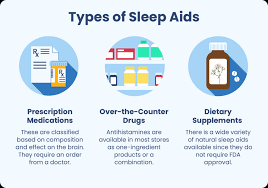The Pros and Cons of Sleep Medications
Sleep disorders affect millions of people worldwide, leading to fatigue, irritability, and a decline in overall health and well-being. For those struggling with insomnia or other sleep-related issues, sleep medications may seem like a tempting solution. However, like any medication, they come with their own set of pros and cons.
Pros of Sleep Medications:
- Improved Sleep: Sleep medications can help individuals fall asleep faster and stay asleep longer, leading to improved overall sleep quality.
- Immediate Relief: In cases of acute insomnia or jet lag, sleep medications can provide immediate relief to help regulate sleep patterns.
- Medical Supervision: Prescription sleep medications are typically prescribed by healthcare professionals who can monitor their effectiveness and adjust dosage as needed.
Cons of Sleep Medications:
- Dependency Risk: Some sleep medications can be habit-forming, leading to dependency issues if used long-term.
- Side Effects: Common side effects of sleep medications include drowsiness, dizziness, headaches, and gastrointestinal disturbances.
- Tolerance: Over time, the body may develop a tolerance to certain sleep medications, requiring higher doses for the same effect.
Before considering the use of sleep medications, it’s essential to consult with a healthcare provider to discuss the potential benefits and risks based on individual circumstances. Alternative approaches such as cognitive-behavioral therapy for insomnia (CBT-I), relaxation techniques, and lifestyle modifications should also be explored as complementary options for improving sleep quality in the long term.
In conclusion, while sleep medications can offer temporary relief for individuals struggling with sleep disorders, they should be used judiciously under medical supervision due to their potential risks and side effects. A holistic approach that combines medication with lifestyle changes may provide the most effective long-term solution for achieving restful and rejuvenating sleep.
Top 6 Frequently Asked Questions About Sleep Medications
- What are the common side effects of sleep medications?
- How long does it take for sleep medications to start working?
- Are sleep medications habit-forming?
- Can I take sleep medications with other prescription drugs?
- What should I do if I miss a dose of my sleep medication?
- Are there any natural alternatives to prescription sleep medications?
What are the common side effects of sleep medications?
Common side effects of sleep medications may include drowsiness, dizziness, headaches, and gastrointestinal disturbances. It is important to be aware of these potential side effects when considering the use of sleep medications and to consult with a healthcare provider if any adverse reactions occur. Monitoring for these common side effects can help individuals make informed decisions about their sleep medication regimen and take necessary precautions to mitigate any discomfort or complications that may arise.
How long does it take for sleep medications to start working?
The time it takes for sleep medications to start working can vary depending on the type of medication and individual factors. Generally, some sleep medications are designed to act quickly, helping individuals fall asleep within 30 minutes to an hour after taking them. However, other medications may take longer to take effect, requiring up to a few hours before inducing sleep. It’s important to follow the prescribed dosage and instructions provided by a healthcare provider to ensure the safe and effective use of sleep medications. Additionally, factors such as metabolism, overall health, and whether the medication is taken on an empty or full stomach can influence how quickly it begins to work.
Are sleep medications habit-forming?
When considering the use of sleep medications, a common concern is whether they are habit-forming. While some sleep medications have the potential to be habit-forming if used improperly or for extended periods, not all sleep aids carry the same risk. It’s essential to follow the prescribed dosage and duration recommended by a healthcare provider to minimize the likelihood of developing a dependency. Consulting with a medical professional can help individuals understand the risks and benefits of using sleep medications and explore alternative approaches to managing sleep disorders effectively.
Can I take sleep medications with other prescription drugs?
It is crucial to consult with a healthcare provider before combining sleep medications with other prescription drugs. Certain medications can interact with each other, potentially leading to adverse effects or reducing the effectiveness of either medication. A healthcare professional can assess your specific medical history, current prescriptions, and individual needs to determine the safety and appropriateness of combining sleep medications with other drugs. Transparency about all medications you are taking, including over-the-counter and herbal supplements, is essential to ensure safe and effective treatment for sleep disorders while minimizing the risk of harmful interactions.
What should I do if I miss a dose of my sleep medication?
If you have missed a dose of your sleep medication, it is important to follow the specific instructions provided by your healthcare provider or pharmacist. In general, if you miss a dose of your sleep medication, you should take it as soon as you remember unless it is close to the time for your next scheduled dose. However, if it is almost time for your next dose, it is recommended to skip the missed dose and resume your regular dosing schedule. It is crucial not to double up on doses to make up for a missed one, as this can increase the risk of side effects or complications. If you have any concerns or questions about what to do if you miss a dose of your sleep medication, it is best to consult with your healthcare provider for personalized guidance and advice.
Are there any natural alternatives to prescription sleep medications?
Many individuals wonder if there are natural alternatives to prescription sleep medications. Indeed, there are several natural remedies and lifestyle changes that can help promote better sleep without the need for medication. Some common natural alternatives include establishing a consistent bedtime routine, practicing relaxation techniques such as meditation or deep breathing exercises, incorporating regular exercise into your daily routine, limiting caffeine and alcohol intake, creating a comfortable sleep environment, and trying herbal supplements like valerian root or melatonin. Consulting with a healthcare provider or a sleep specialist can also provide guidance on incorporating these natural alternatives into your sleep routine effectively.



